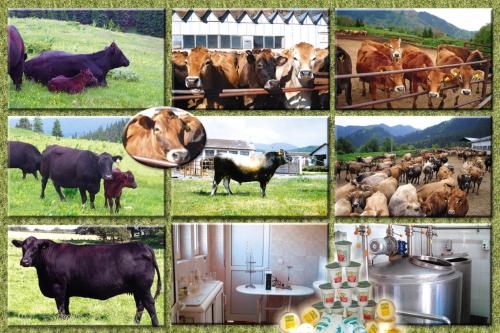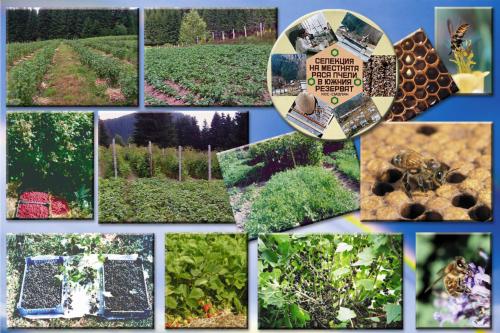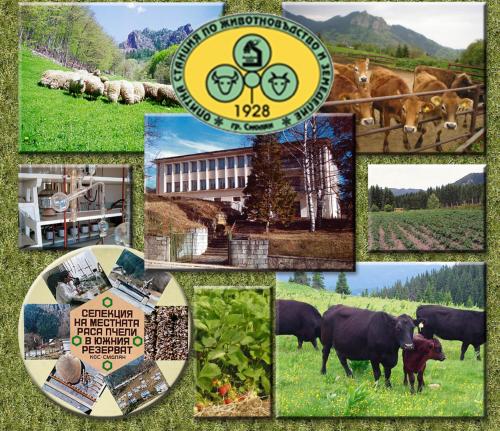|
Brief Introduction to the Agricultural and Stockbreeding Experimental Station Smolyan
The Agricultural and Stockbreeding Experimental Station is located in the outskirts of City of Smolyan in the center of the Rhodopes Mountain at average altitude of about 1000m above the sea level. The Rhodopes are characterized by a combination of high mountainous ridges, divided by deep river valleys with predominant coniferous forest and pastures. The area falls into the temperate climate zone but the microclimate varies considerably because of the relief’s influence (altitude above sea level and orographical barriers, exposure of the slopes). The average annual temperature is between 7 and 9 degrees C°. The annual precipitation is within the range of 700 to 900 litres .The winters are mild and snowy, with short not severe cold spells due to the fencing slopes on the west and the north. The summers are cool and damp, and the autumns are long and warm. The Smolyan municipality is located in a zone of the brown forest soils and their subtypes. Dark brown forest soils under spruce forests, clay sandy soils and stony soils with a loose structure and poor in
humus have been described. Soil composition favors Middle European plant species including medicinal plants. Tobacco and potato have been established as the major crops in the area. The highest forest belt consists of of spruce, Scotch pine and beech with an underforest of whortleberries. The lower elevation zone is occupied with herbaceous vegetation and cultivated plants. Forest is rich with rabbits, foxes, wild boars, deer and some bears. Rivers are full of trout and barbell. The State Experimental Cattle Ranch (Farm) was founded in Smolyan in 1928 under a directive of the Ministry of Agriculture. The major goal of the ranch (farm) was to conduct research and work on the improvement of the local, Rhodopes breed of shorthorn cattle. The farm later became an experimental station of the Bulgarian Academy of Agricultural Science. This laid the foundation for research on high altitude (upland/mountain) agriculture and stockbreeding in the area. To improve the local cattle breed, Jersey cattle were introduced in the region in 1958. Breeders from the station worked on crossings of the two breeds and as a result a breeding scheme was established. The newly developed and much improved race of Bulgarian Rhodopes Cattle, Rhodopes Jersey, was officially recognized in 1989. During this period the station breeders carried out successful research on improving of the
local, Middle Rhodopes, breed of sheep as well. After 30 years of hard work a new race of Rhodops Tzigai was established in 1990. In 1960 scientists started the apiculture research in the Station. The researchers studied morphological and biological characteristics of the local bees that proved to be very well adapted to the local conditions and disease resistant. Different technologies of bees breeding have been tested and investigating of the vegetation composition for honey production, and characterization of local honey also have been carried out. Agricultural research is mainly focused on potatoes with objectives of establishing of an adequate crop rotation scheme for production of quality seed material and evaluation and application of methods and measures for efficient control of potato cyst nematode. Currently, there are six research scientists working in the station with four of them possessing PhD degrees. Two of these scientists work on sheep breeding, two on the cattle breeding, one on potatoes and one the bee selection. Other staff at the station includes 10 more involved in research activities and 17 people in the production base. The station has a specialized laboratory conducting tests of forage, diary and bee products. The station has a library, reading room and a conference room. Current research is mainly focused on five projects in collaboration with the Institute of Mountain Stockbreeding and Agriculture in Troyan and the Institute of Cattle Breeding in Kostinbrod:
The Station scientists are also involved in some projects with
Priority for future research will be given to preservation and maintenance of the valuable local races of cattle, sheep and bees and their future improvement, and production of quality breeding material from Bulgarian Rhodopes Cattle race that is stable in the next generations. The Experimental Production Base of the station maintains herds of cows from “Bulgarian Rhodopes Cattle” race, sheep from the “Rhodopes Tzigai” and “Karacachanska” races, and bees from the “Middle Rhodopes” race, registered by the National breeding fund /stock/. The Еxperimental station, Smolyan, offers consulting and extension services for the farmers of the region on the problems of the mountain stockbreeding and agriculture including:
|


